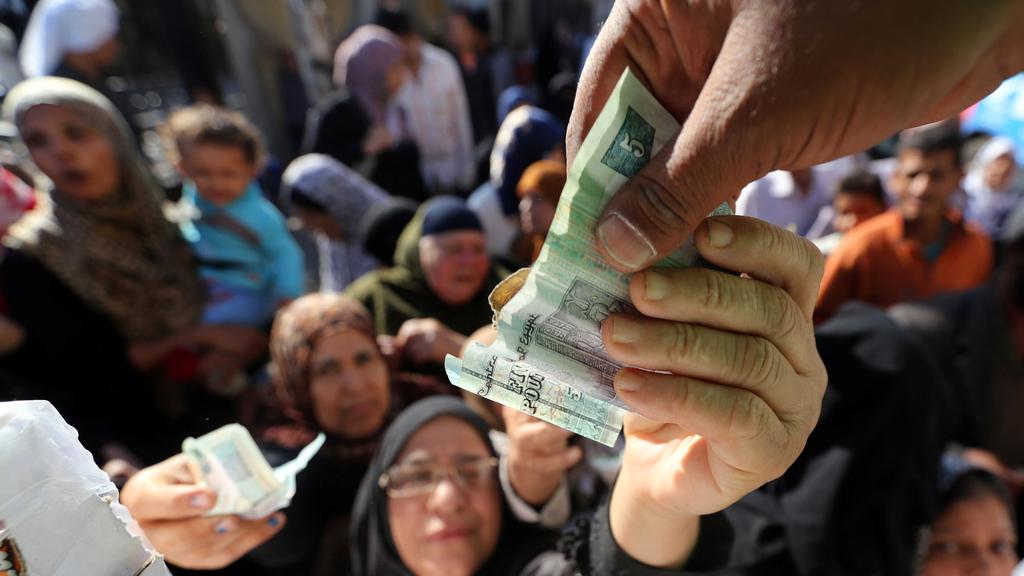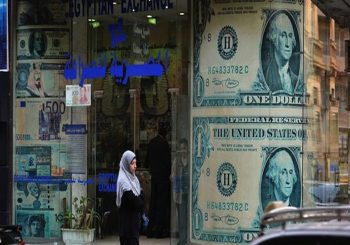Over the past months, the economy has become the talk of every gathering across Egypt. Whether you are in business, a consumer trying to find a product you need at a price you can afford, a government official thinking about the growing number of challenges facing the economy, or just a private citizen, concerned about the wellbeing of the country, the economy is likely to have been a main feature in your recent conversations.
As Egypt grapples with the challenges of increasing inflation and the changes in interest rates, citizens try to make sense of the causes of these events, asking themselves what they mean, how they are related, how they came about, and how best to circumvent the difficulties they present.
Here are a few questions you may be asking yourself about the situation, and a few answers that might help you understand the bigger picture.
What is inflation?
In simple and practical terms, inflation is the rise in prices of goods and services. For example if yesterday a ta’meya sandwich cost EPG 10, and today it costs EGP 12, then its price has ‘inflated’ by 20 percent. Overall inflation is measured by the average increase in the prices of the most commonly consumed goods and services.
But what causes this rise in prices? Prices of goods and services are determined by supply and demand. When there is an increase in disposable income with the consumers, or a decrease in the goods available in the market, and the reasons this can happen are numerous, inflation occurs.
Going back to the ta’meya example: Let’s say there is a supply of 200 ta’meya sandwiches and citizens are all in possession of EPG 2,000 disposable for buying ta’meya. In this case it makes sense to price the sandwiches at EGP 10 apiece. However, if citizens are in possession of EGP 200,000 – an increase in demand – and the supply of sandwiches remains at 200, vendors raise the price of the sandwiches to even out the abundance of disposable income.
Similarly, if shops can suddenly produce only 100 sandwiches – decreasing supply – while people’s disposable income remains at EGP 2,000 collectively, the price of sandwiches also has to rise to EGP 20, again to even out the supply and demand.
What caused the rise in inflation to begin with?
So, we’ve established that the prices of goods and services are determined by supply and demand, and that in the event of increased demand, short supply, or both, prices rise, meaning an increase in inflation. So what caused the increase in inflation in Egypt to begin with?
Firstly, this wave of inflation is not specific to Egypt. With the world economy reeling from the challenges posed by the COVID-19 pandemic and the resultant disruptions in supply chains, as well as the more recent conflict that has erupted between Russia and Ukraine wreaking havoc in the critical energy and food supply markets, supply has been affected globally, consequently inflating the prices of goods and services, particularly food products.
Egypt in particular is a nation that is heavily reliant on imported products, particularly wheat – a commodity that was particularly affected by the Ukraine War – and has consequently suffered heavily from these disruptive events.
Economists add other factors that are exclusive to Egypt, in particular the large government spending in the massive construction and infrastructure projects over a relatively short period of time, which increased the disposable income circulating in the economy.
How did the government respond?
When the Ministry of Finance or the Central Bank of Egypt (CBE) find that there is inflation, there are several policies that can be implemented, for instance supporting manufacturing or lowerding customs fees on raw materials. However the effects of these policies are minimal compared to moving to decrease the amount of money flowing through the market, and working towards increasing availability of products.
This is where raised interest rates come into play. On 19 May, the CBE announced that interest rates on overnight deposits and loans would be raised by two percent, all with the intention of curbing inflationary pressures. Which takes us on to the next question.
How do rising interests affect inflation?
Interest rates are the percentage of return on deposits as well as the cost of borrowing money that is paid back along with the borrowed amount. Lower interest encourages people to spend, rather than save their money, and borrow and spend even more on housing or purchasing expensive goods, or investing in business, for example. On the other hand, higher interest rates encourage people to save more of their income, to benefit from the higher returns and avoid borrowing at the higher cost.
By raising interest rates, the CBE has incentivised saving and depositing money, rather than keeping it liquid for spending. People will certainly continue to spend and consume, but the share of their income that they designate for spending will decrease in favour of the share they set aside and deposit, thus taking it out of circulation.
How does all of this affect you?
The rise in prices has affected every home, individual, and business in Egypt in recent months, as has the drop in the value of the Egyptian Pound. Increased interest rates bring benefits to those who happen to have enough income to save. However, those with less income will have to hope that higher interest rates are effective in dampening inflation, to relieve them from the heavy burden of higher prices. But the main victim of higher interest is usually jobs, as it increases the cost of borrowing, thus putting downward pressure on new investments, which means less jobs created.
This is why all sides hope that this is a brief economic hiccup, and that the measures taken are sufficient to make the economy settle down before the toll gets any heavier.







Comments (3)
[…] is being rebuilt and renewed, but movement throughout the city remains often slow, and with inflation and price hikes, its cost is rising. Meanwhile, the means of transport that are affordable to […]
[…] Egypt’s government, citizens, and businesses have been grappling with the challenges of rising inflation. In McDonald’s case, their solution to Egypt’s inflation challenges was to […]